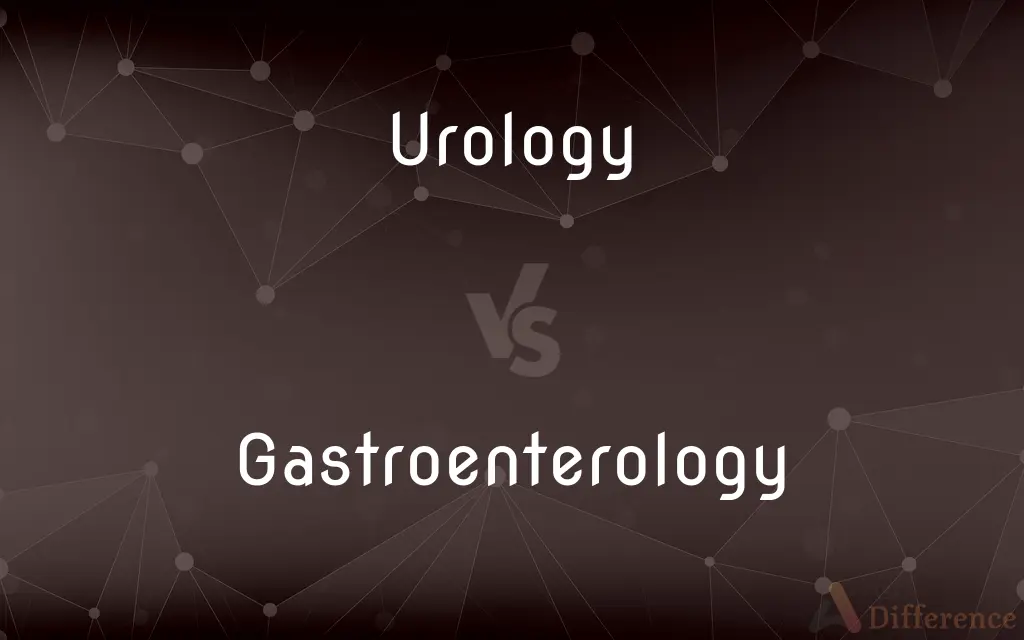Urology vs. Gastroenterology — What's the Difference?
By Tayyaba Rehman — Updated on November 2, 2023
Urology focuses on urinary tract diseases and male reproductive organs; gastroenterology deals with the digestive system's disorders.

Difference Between Urology and Gastroenterology
Table of Contents
ADVERTISEMENT
Key Differences
Urology is a medical specialty that deals with the urinary tract system in both men and women and the male reproductive organs. It encompasses the kidneys, ureters, bladder, urethra, and male reproductive organs. Gastroenterology, on the other hand, specializes in the digestive system, from the mouth to the anus, including the stomach, intestines, liver, pancreas, and gallbladder.
Urologists perform surgical and non-surgical procedures for issues like kidney stones, bladder control, and prostate conditions. Gastroenterologists treat conditions such as acid reflux, inflammatory bowel disease, and hepatitis. They perform endoscopic procedures to diagnose and treat these disorders but do not usually conduct major surgery.
While urology is known for addressing issues like urinary incontinence and erectile dysfunction, gastroenterology often involves managing diet-related disorders and lifestyle diseases. Both fields require deep knowledge of internal systems but focus on distinct anatomical structures and systems.
Diagnostic techniques in urology include cystoscopy and urodynamic testing, whereas gastroenterology frequently uses procedures like colonoscopies and endoscopies. These tests reflect the differing scopes of practice within each specialty.
Both urologists and gastroenterologists may work with patients of any age. Pediatric subspecialties exist for each, focusing on the unique conditions present in children, illustrating the breadth and depth of each specialty.
ADVERTISEMENT
Comparison Chart
Anatomical Focus
Urinary tract and male reproductive organs.
Digestive system from mouth to anus.
Common Procedures
Cystoscopies, prostate biopsies, vasectomies.
Colonoscopies, endoscopies, liver biopsies.
Conditions Treated
Kidney stones, urinary incontinence, prostate cancer.
Acid reflux, IBD, liver cirrhosis.
Surgical Involvement
Both surgical and non-surgical treatments.
Mainly non-surgical, with some procedures.
Subspecialties
Pediatric urology, urologic oncology, renal transplantation.
Pediatric gastroenterology, hepatology, intestinal transplantation.
Compare with Definitions
Urology
The branch of medicine dealing with male reproductive issues.
Urology clinics often offer vasectomy services.
Gastroenterology
A specialty for treating intestinal diseases.
Gastroenterology is evolving with new treatments for IBD.
Urology
The practice of diagnosing urinary diseases.
Urology has advanced in diagnosing bladder cancer.
Gastroenterology
The practice of endoscopic diagnostic procedures.
Gastroenterology often requires performing a colonoscopy.
Urology
Medical care for urinary dysfunction.
Urology departments commonly treat urinary incontinence.
Gastroenterology
The medical field focused on digestive health.
She consulted a gastroenterology expert for her stomach issues.
Urology
The medical study of the urinary system.
He chose urology as his specialty because of his interest in kidney health.
Gastroenterology
Medicine involving the liver, pancreas, and gallbladder.
His interest in liver disorders led him to gastroenterology.
Urology
A field involving surgical interventions of the urinary tract.
The surgery required a skilled urology team.
Gastroenterology
Healthcare for patients with nutritional issues.
Gastroenterology includes managing diets for celiac disease.
Urology
Urology (from Greek οὖρον ouron "urine" and -λογία -logia "study of"), also known as genitourinary surgery, is the branch of medicine that focuses on surgical and medical diseases of the male and female urinary-tract system and the male reproductive organs. Organs under the domain of urology include the kidneys, adrenal glands, ureters, urinary bladder, urethra, and the male reproductive organs (testes, epididymis, vas deferens, seminal vesicles, prostate, and penis).
Gastroenterology
Gastroenterology is the branch of medicine focused on the digestive system and its disorders. Diseases affecting the gastrointestinal tract, which include the organs from mouth into anus, along the alimentary canal, are the focus of this speciality.
Urology
The branch of medicine that deals with the diagnosis and treatment of diseases of the urinary tract and urogenital system.
Gastroenterology
The branch of medicine which deals with disorders of the stomach and intestines.
Urology
(medicine) The surgical specialty of medicine that treats disorders of the urinary tract and the urogenital system.
Gastroenterology
The branch of medicine that deals with the diagnosis and treatment of diseases and disorders of the digestive system.
Urology
See Uronology.
Gastroenterology
(medicine) The study of the digestive system, from the mouth to the anus; may also include the study of accessory organs: pancreas, liver, gallbladder and bile ducts.
Urology
The branch of medicine that deals with the diagnosis and treatment of disorders of the urinary tract or urogenital system
Gastroenterology
The branch of medicine that studies the gastrointestinal tract and its diseases
Common Curiosities
Do I need a referral to see a urologist?
Generally, a referral from a primary care physician is needed to see a urologist.
Can urologists perform surgery?
Yes, urologists perform both surgical and non-surgical treatments.
What is a common procedure in gastroenterology?
A common procedure in gastroenterology is a colonoscopy.
Can children see a urologist?
Yes, there are pediatric urologists for children's conditions.
What kind of tests do gastroenterologists use?
Gastroenterologists use endoscopies and biopsies to diagnose conditions.
What does urology cover?
Urology covers the urinary system and male reproductive health.
Are gastroenterologists surgeons?
Gastroenterologists primarily perform diagnostic procedures, not major surgeries.
What does gastroenterology cover?
Gastroenterology covers the digestive system's disorders.
Are dietitians part of gastroenterology?
Dietitians often work with gastroenterologists for nutritional guidance.
Is erectile dysfunction treated by urology?
Yes, erectile dysfunction is treated within the field of urology.
What kind of tests do urologists use?
Urologists use cystoscopies and urodynamic tests, among others.
Do urologists treat kidney disease?
Yes, urologists diagnose and treat various kidney diseases.
Does gastroenterology treat liver diseases?
Yes, liver diseases are treated by gastroenterologists.
Are urinary tract infections treated by urologists?
Yes, UTIs are commonly treated by urologists.
Can gastroenterology help with acid reflux?
Gastroenterology specializes in treating acid reflux.
Share Your Discovery

Previous Comparison
Iron vs. Tin
Next Comparison
Support vs. ProtectionAuthor Spotlight
Written by
Tayyaba RehmanTayyaba Rehman is a distinguished writer, currently serving as a primary contributor to askdifference.com. As a researcher in semantics and etymology, Tayyaba's passion for the complexity of languages and their distinctions has found a perfect home on the platform. Tayyaba delves into the intricacies of language, distinguishing between commonly confused words and phrases, thereby providing clarity for readers worldwide.
















































